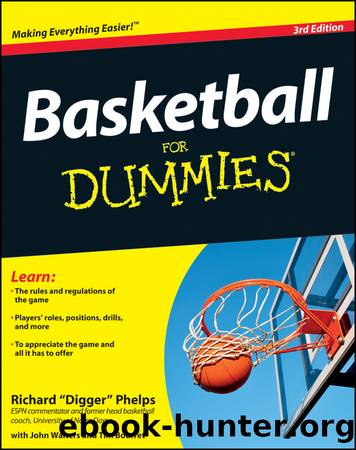Basketball For Dummies by Richard Phelps

Author:Richard Phelps
Language: eng
Format: epub
Publisher: Wiley
Published: 2011-09-09T00:00:00+00:00
To call time-out or not to call time-out: That is the question
Hereâs the scenario: Youâre down one with ten seconds left in the game, and your team just grabbed a defensive rebound. Do you take a time-out, or do you just let the players run the fast break and ad lib? If you call time-out, you can set up a play. But does the time-out help the defense more?
My gut reaction as a coach: Go to the hole. The offense knows where itâs going, and the defense has to react. Basketball is a game of matchups, and a time-out before a last possession is to the defenseâs advantage. Plus, a coach can have her team play a matchup zone or some defense you havenât seen before, and your offense wonât have an opportunity to react to it. With no time-out, the scene is too chaotic for your opponent to set up anything more than its most basic defense. You also run the risk of not getting the ball in-bounds or committing a turnover.
In your last time-out in a close game, plan ahead. If you call time-out with 30 seconds or less remaining, set up what you will do on offense and defense if you need to pull out a last-second play.
Preparing for the Big Game
All conscientious coaches prepare to the best of their ability for each game. But every schedule includes games that loom just a little bit bigger than the rest. Whether it be your big rival, the number-one team in your conference or league, or the number-one team in the nation, these games require special preparation.
My Notre Dame players always knew which games were the big ones. As a coach, you donât want your players to look past lesser teams, but you do want them to be ready for the big games. At the college level, these contests determine your seed in the NCAA tournament, not to mention the morale of your squad.
Scout the opposition â and yourself
I usually watched three videotapes of the upcoming opponent and then met with my assistants to develop a game plan. Today coaches have video available for all games, but they still just try to view the five most recent games when they get into the middle of the season.
Sure, you need to know your enemy. But you also need to take an honest look at your own team. Doing that is just as important, if not more so, as preparing to face a particular opponent.
Before a big game during a Notre Dame season, we would pay an outside service to scout our team and identify the areas in which we needed work. On my own, I liked to review our last two or three losses (which hopefully required more long-term than short-term memory skills) and see what needed fixing. If we werenât getting the ball into the post, for example, I tried to figure out why.
Challenge the opposing teamâs star
A big game means a tough opponent, who probably has at least one outstanding player.
Download
This site does not store any files on its server. We only index and link to content provided by other sites. Please contact the content providers to delete copyright contents if any and email us, we'll remove relevant links or contents immediately.
| Coaching | College & University |
| Professional |
Relentless by Tim S Grover(1728)
Relentless: From Good to Great to Unstoppable by Tim S Grover(1328)
Work On Your Game by Dre Baldwin(1293)
Time's Champion by Time's Champion (Craig Hinton & Chris McKeon)(1031)
Good Clean Fun by Nick Offerman(1028)
The Cities by K.A Knight(926)
Calisthenics: Core CRUSH: 38 Bodyweight Exercises | The #1 Six Pack Bodyweight Training Guide by Pure Calisthenics(916)
How to Be Like Mike by Pat Williams(907)
Coach Wooden and Me by Kareem Abdul-Jabbar(905)
Betaball by Erik Malinowski(885)
The Blueprint by Jason Lloyd(869)
Dream Team by Jack McCallum(854)
Friends Lovers and Family by Unknown(832)
The Punch by John Feinstein(809)
Red and Me by Bill Russell(792)
LeBron, Inc. by Windhorst Brian;(785)
Long Shots by Jay Bilas(764)
Seven Seconds or Less by Jack McCallum(734)
Rise and Fire by Shawn Fury(729)
